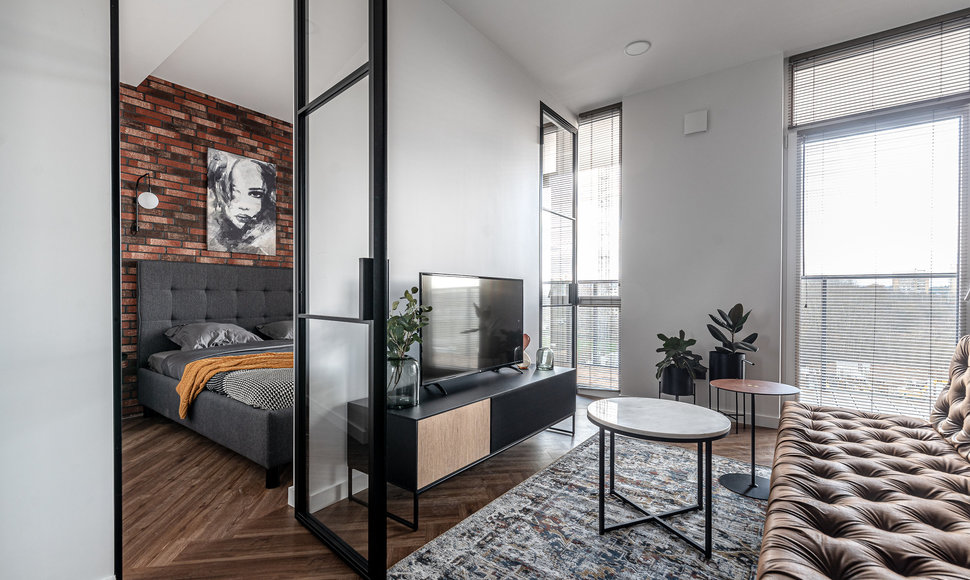Mantas Mikalauskas is an analyst at Darnu Group, one of the largest companies in the country engaged in the creation of living, business and recreational spaces. According to Mikalauskas, a significant decrease in the number of home buyers-investors led to a decline in demand of small 40 square meter apartments. A large part of these apartments was used to be purchased for long-term or short-term rent. However, the rent of apartments remarkably declined following the introduction of restrictions for foreigners to arrive in Lithuania.
Mikalauskas points out that this trend is going to continue in the near future, as there is still a great deal of uncertainty in the world about the ability of individual countries to deal with the virus. So, various travel restrictions will further prevent the recovery of flow of foreign tourists to Lithuania.
"The restrictions on tourism that were introduced during and after the lockdown has stifled the development of the short-term rental market. Part of the apartments have been leased for long-term rent. However, most of potential buyers had to reconsider their plans.
It should be noted that such behaviour of buyers should not become a long-term tendency. If the situation does not change back to the previous one, observed during the lockdown, and travel restrictions continue to ease gradually, everything should return to normal in autumn,” says Mikalauskas.
According to him, various measures to boost the economy and cash flows injected by the states will trigger a surge in inflation in the long run, increasing the desire of people to return to real estate as a safe investment. Mikalauskas suggests that the buyers will be guided by a sense of caution and consequently look for reliability.
"Inflation has always encouraged buyers to invest into viable high-value real estate. The current situation is characterized by the growing number of buyers interested in ongoing projects implemented by reliable developers,” Mikalauskas assumes.
Larger apartments become more popular
Mikalauskas notes that as more and more people work and study from home, the need for more spacious apartments has become more evident. So, there will be a need for larger housing, as well as the need for more efficient planning of housing spaces.
“For a long time, we have seen a trend that people were more interested in an apparent as such or its functionality, rather than square meters. 42 square matter two-room apartments were the most popular, rather than 50 square meters. The smaller apartments cost cheaper and, in fact, perform the same function as the larger one. Now people are convinced that space and a separate room may be a necessity, because it is not convenient to work on an ironing board,” says M. Mikalauskas.
According to him a number of companies offer to work part of the time from home and take a more flexible approach to remote work than before. This change is a factor for people to look for larger housing.
"I would like to provide an example. A couple who booked a two room apartment in the Paupys project that we are developing started looking for a larger apartment there, just because they started working from home during lockdown," points out Mikalauskas.
Needs for interior are changing
Architect Aidas Barzda has also noticed that the whole industry has changed after the lockdown, and subsequently architecture and interior is changing as well. He says that even creative, material and space solutions will undergo a change.
"Most of the current interior and architectural details, which seem completely normal to us, have also appeared to prevent infectious diseases and improve hygiene. We just got used to them and accepted them as a completely normal standard.
White tiles are intended to make it easy to spot dirty surfaces and clean them immediately, and the large windows and balconies are designed to get as much fresh air and light into the house as possible, which improves people's well-being. I could provide a lot of such examples, but none of us are surprised by them anymore,” says Barzda.
According to Barzda, before the lockdown there was a tendency to focus more on design and aesthetics than practicality. Now we observe the opposite trend. Practicality and the need for separate spaces are becoming the important aspects of housing. There is a preference for materials that are easy to clean and maintain, while basic home planning spaces have changed remarkably.
"If previously someone was happy with a comfortable sofa and an electric plug next to it to use the computer for some of their work, now they want to have a separate space dedicated to work, with a full structure of a home office and the feeling that your home serves as a place for work or studies,” notes Barzda.
In his words, individual spaces have become more important, with people putting more value on privacy, detachment and concentration. People now take more care of their environment, and homes became tidier, better organized and more loved so that people could feel comfortable in them even in unforeseen situations.












